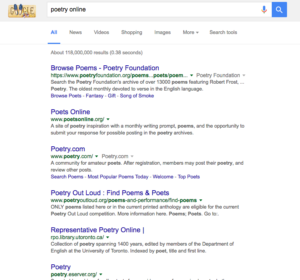One of the first lessons in this workshop we had was that the stanza is a room, in the sense that it is both self-contained but also communicates with other parts of the poem. Thinking about this at the end of the workshop, it made more and more sense.
I think then I also thought of the stanza as being waves constantly crashing against the shores of the overall poem. The form of each stanza seemed to beat against the content, the meaning of the poem that I was forming through the very visual aesthetic of the poem. The lines of the poem would be like the incoming tide, often predictable or the lines could be short, brusque or unexpectedly long, like a storm, setting the mood either way for the reader.
In the sense that the stanza is a room with aspects of it flowing from previous lines to and to the next but also acting as a self-contained unit, the “waves” that beat the narrative or meaning also flow from one to the other. In brainstorming metaphors, I think that’s a pretty good one for the stanza and I think it’s interesting that while looking through my notebook, I found this particular metaphor (of the wave) on the very first lesson while reflecting.
I always have, even though I’ve broken more out of the habit after using form more rigidly this semester, written more from whatever came naturally with the story I had in mind, letting the poem flow. I think the waves of the thoughts that go through our head fit this metaphor, as those thoughts flow onto the page to form the poem itself. Of course, those waves might not look as it did initially, or even the same or even contain any of the original words in its final, published form but that’s what revision is for. I think as far as first drafts go, seeing each stanza, the flow of idea to sheet of paper or keyboard is a good start.

